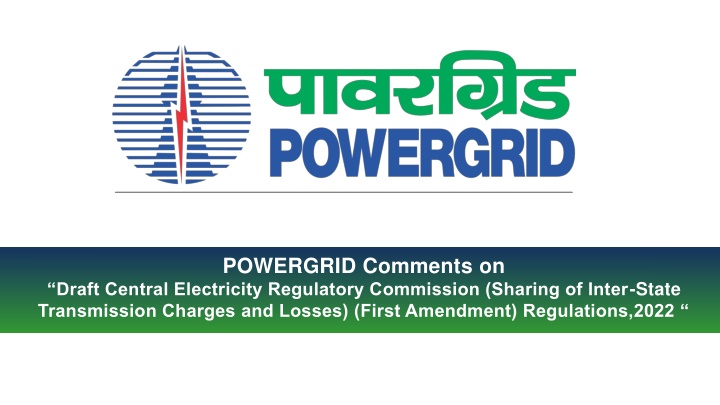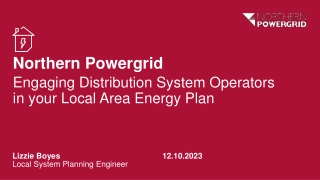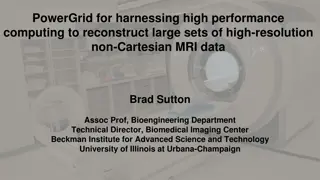POWERGRID
In response to the Draft Central Electricity Regulatory Commission's proposed amendment regarding the sharing of inter-state transmission charges and losses, POWERGRID provides insights on the treatment of transmission charges in specific cases, emphasizing the need for coordination in developing ISTS systems and addressing issues related to mismatch charges payable by generators due to delays in transmission projects.
Download Presentation

Please find below an Image/Link to download the presentation.
The content on the website is provided AS IS for your information and personal use only. It may not be sold, licensed, or shared on other websites without obtaining consent from the author.If you encounter any issues during the download, it is possible that the publisher has removed the file from their server.
You are allowed to download the files provided on this website for personal or commercial use, subject to the condition that they are used lawfully. All files are the property of their respective owners.
The content on the website is provided AS IS for your information and personal use only. It may not be sold, licensed, or shared on other websites without obtaining consent from the author.
E N D
Presentation Transcript
POWERGRID Comments on Draft Central Electricity Regulatory Commission (Sharing of Inter-State Transmission Charges and Losses) (First Amendment) Regulations,2022
Draft CERC Sharing Regulations, (First Amendment) Clause as per existing regulation Changes proposed in draft Amendment 13. Treatment of transmission charges and losses in specific cases and losses in specific cases POWERGRID Comment 13. Treatment of transmission charges Coordination for development of ISTS system is done by CTU. In case of delay of their transmission system, Inter-State transmission licensee(s) may not be aware of the quantum of power required to be evacuated through such alternate arrangement. Further, the transmission licensee shall not be able to plan the required alternate arrangement. Transmission licensee can only implement such alternate arrangement which is planned by CTU. Therefore following is proposed ; (8) In case a generating station or unit(s) thereof has achieved COD and the Associated Transmission System is delayed, the concerned inter-State transmission licensee(s) shall make alternate arrangement at its own cost for despatch of power of the generating station or unit(s) thereof in consultation with the Central Transmission Utility: (8) In case a generating station or unit(s) thereof has achieved COD and the Associated Transmission System concerned inter-State transmission licensee(s) shall make alternate arrangement at its own cost for despatch of power of the generating station or unit(s) thereof in consultation with the Central Transmission Utility: is delayed, the (8) In case a generating station or unit(s) thereof has achieved COD and the Associated Transmission System is delayed, CTU in consultation with concerned inter-State transmission licensee(s) and generating station utility shall plan the concerned shall make alternate arrangement at its own cost for despatch of power of the generating station(s) or unit(s) thereof which shall be implemented by concerned inter-State transmission licensee(s) at its own cost in consultation with the Central Transmission Utility: Provided that till such alternate arrangement is made, the inter-State licensee(s) shall pay to the generating station, the Yearly Transmission corresponding to the quantum of Long Term Access Connectivity for the period for which the transmission system has got delayed. Provided arrangement is made, the inter-State transmission licensee(s) shall pay to the generating station, the Yearly Transmission Charge corresponding to the quantum of Long Term Access for the period for which the transmission system has got delayed. that till such alternate transmission Charge Provided that till such alternate arrangement is made, the inter- State transmission licensee(s) shall pay to the generating station, the Yearly Transmission Charge corresponding to the quantum of Long Term Access Connectivity for the period for which the transmission system has got delayed. Maharatna CPSE 2
Additional comments on Mismatch Issue ISTS transmission element/project are being executed in both TBCB and RTM mode. Upstream and Downstream network consists of Generator, RTM/TBCB ISTS transmission elements of same or other transmission licensee and Intra state networks. Generation, Transmission and distribution are distinct businesses with inherent different time lines for implementation, risk factors and challenges associated with them. All infrastructure projects particularly linear projects such as transmission projects are prone to delay due to factors beyond the control of the developers and despite best-coordinated efforts, mismatch in some cases is unavoidable. Further, there can be great difference in scope of work of the two Transmission Licensees e.g., one Transmission Licensee will make the line whereas other Transmission Licensee will make the substation bays. Therefore, present philosophy of bilateral billing under regulation 13. (12) leads to a situation where a Transmission Licensee s liability is left open and may not be commensurate with its investment. Issue regarding mismatch charges payable by generators has largely been addressed with notification of GNA regulations wherein the same has been made rational and predefined. However, mismatch charges payable by transmission licensees is still an area of concern and it is required that their liabilities under mismatch conditions are similarly made rational and predefined. Maharatna CPSE 3
Additional comments on Mismatch Issue Suggestions: In view of the discussion, following is proposed: o Transmission project may be allowed to recover its tariff from POC pool i.e. under Regulation 5 to 8 of Sharing Regulations, 2020 in cases of delay by associated upstream/ downstream entity. In cases where both tr licensees are delayed due to force majeure events, they may be allowed to get relief as per provision for extent Tariff regulations on RTM and TSA in TBCB as the case may be. o In case where delay is not on account of Force Majeure conditions, adequate provisions are available under Regulation/TSA provides for deduction/LD as a penalty. TSA provides for levy of LD on TSP and similarly IDC & IEDC is disallowed for RTM. Therefore, no additional penalty in form of mismatch charges be imposed on the TSP on account of delay. o If necessary and required, a predefined liability restricting it to certain fixed % of the Yearly transmission charge of the delayed element or some reasonable amount for week of delay may be imposed on the TSP which shall be returned to the pool upon its recovery. This will ensure seriousness on the part of TSPs and will also help in reducing tariff burden on the DICs. Maharatna CPSE 4



